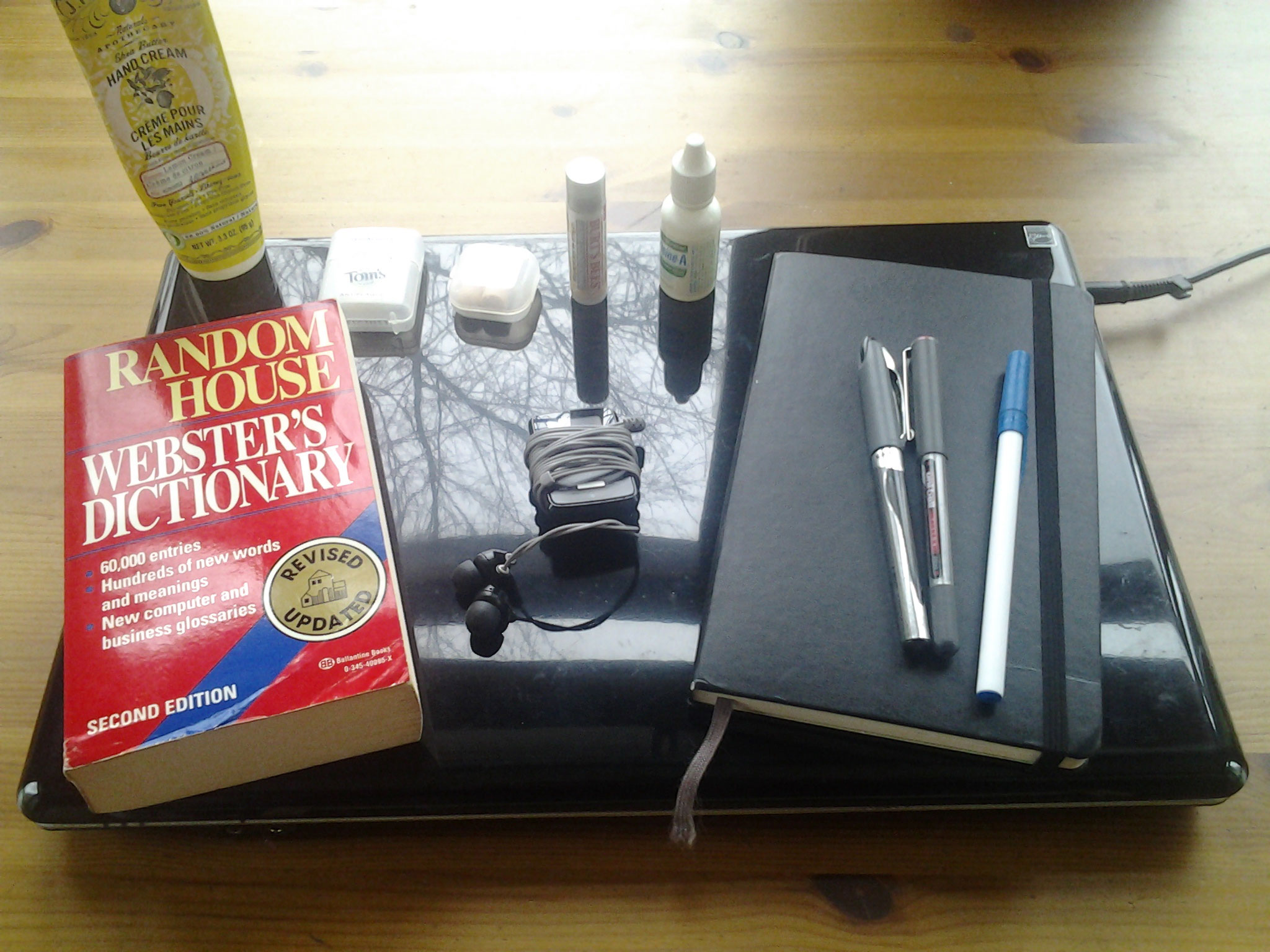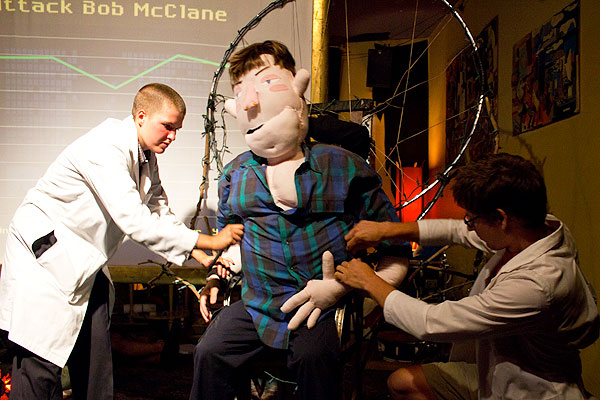That’s it, this site is shutting down—I’m outta here
Just wanted to throw up one last post to say thanks to Blake for letting me write here, and to Gene for editing. And extra-giant-sized thanks to everyone who read and responded to the silly things I posted. I always had a great time perusing this site, and chatting with others in the comments. I was honored to get to contribute. See you around, I hope, elsewhere on the internet, and maybe even real life.
Announcing Requited #10
I’m pleased to announce that the tenth issue of Requited is now online and contains:
- Fiction by Rich Ives and Lauren Wallach;
- Poetry by Janelle Adsit, Naomi Buck Palagi, Lance Garland, Matt Trease, Lina ramona Vitkauskas, and Caroline Crew & Chris Emslie;
- Nonfiction by Virginia Konchan and Jarrett Neal;
- Visual art by Jenny Magnus, Nicole Matos, and Zoe Nelson.
Furthermore, in the journal’s rapidly-growing archives, you’ll find poetry by Molly Gaudry and Nate Pritts; fiction by James Tadd Adcox, Jimmy Chen, Jac Jemc, Tim Jones-Yelvington, and Suzanne Scanlon; nonfiction by William Bowers, Jeremy M. Davies, Julianne Hill, Steve Katz, Mark Rappaport, Keiler Roberts, Viktor Shklovsky, and Curtis White; interviews with Robert Ashley and Vanessa Place—and other wonderful things.
Enjoy!
How I wrote my latest novel, part 2
Last week, I documented how I came up with the initial idea for my latest novel—“Lisa & Charlie & Mark & Suzi & Monica & Tyrell,” which I was then calling “The Porn Novel”—and how I simultaneously began exploring that idea and laying out some basic formal parameters. I also provided a general overview of my general writing process. Today I’ll cover how I finished this initial exploratory period and settled into a stronger sense of the project as whole. Again, my hope is that these posts will prove useful to other writers, and interesting to everyone on God’s green earth. Because I remember very clearly that, during the decade I spent writing my first novel, Giant Slugs, I often felt frustrated and confused. And while every writer must figure ultimately things out for her or himself, some of my strategies and methods might prove theft-worthy—or at least provide a good laugh.
So I’d gotten to the point where I’d translated the original idea (“a pornographic novel that doesn’t contain any sex”) into a more specific approach: six chapters featuring six friends meeting up for six meals. I knew that each chapter was going to be long, to make the absence of salacious material more palpable. And I’d whipped up some character names, and sketched out a list of potential meals.
I also tried estimating how long each chapter would have to be. I decided that, in order to convey the proper feel, the first five chapters should be at least 20 pages each, and that the final chapter (the group dinner) should be longer—at least 30 pages. That added up to 130 pages minimum, which felt like the shortest the project could be. I translated that into word counts, since I think better that way (for one thing, I always single-space my manuscripts, since years of teaching/grading, not to mention taking writing workshops, have led me to despise the look of double-spaced manuscripts). I had a sense that the project would be dialogue-heavy and not contain any long paragraphs, running maybe 250 words/page. Hence, the projected numbers worked out to 5000+ words apiece for chapters 1–5, and 7500+ words for chapter 6. These were just targets, of course, but having a rough idea of what I’m aiming at helps me pace myself, and estimate how long the writing will take.
I also started my writing journal. I use Excel for this and it’s nothing extravagant; I just note each time that I work, and jot down a few words as to what I did. I also track the word counts as they change (using blue for increases and red for decreases). And while this habit of mine is probably the sign of a diseased mind, it helps keep me motivated, encouraging me to “log in” every day, and stick to my routine. It’s not unlike tracking my workout routines, or the movies that I watch. Plus it yields data I can later analyze, which is the only thing that sustains me through the long cold Chicago winter. (Dear NSA, I hear you had an opening recently? Call me!)
Now before you think me entirely insane, consider this. I have a simple litmus test for what enters/exits my writing routine: is it fun? I write a lot, and want to enjoy it, and make it something I look forward to doing. As such, I’m always looking for little ways to reward myself, and to make the situation more pleasant / less stressful.
For example: when I was younger and writing only fitfully, I mostly wrote late at night, even though I never had much success doing that. Writing was something I did after stressing out about it all day, feeling guilty about not having gotten any work done. After a decade or more of that, I switched to writing in the morning—and, believe me, I did not think I was a morning person at that time. But I started living with a yoga instructor who taught early morning classes. So I started getting up at 5 AM and, amazingly, I discovered that I was much more productive and happier when I wrote then. (I also realized that predawn is my favorite time of day.) That experience taught me to examine the rest of my writing routine, and to try making it more enjoyable overall. So my Excel files are in some sense silly, yes—but they are my only friends, and I name them, and I love them.
Here’s a snapshot of the journal that I made:
How I wrote my latest novel, part 1
I’ve wanted for a while now to try writing a story “live” here, posting my work as I went from initial idea to finished piece. I might still do that, but for now, here’s a related series of posts. I spent the past forty days writing a new novel (“Lisa & Charlie & Mark & Suzi & Monica & Tyrell,” though my working title was “The Porn Novel”), and want to share with you how I did that. My hope is this will prove less an exercise in vanity and more something instructive—like, you might want to do the exact opposite of me.
Let me state up front that I don’t think there’s any one way to write novels, or fiction, and I don’t approach all of my projects in the same way. And what works for me may not work for you. But I have developed some basic procedures that I find useful and that you might enjoy trying. Also, this time around, I encountered some formal problems that should make for good discussion.
I write pretty quickly, but forty days is the fastest I’ve written a novel. (This is the third one I’ve really completed.) My first novel, Giant Slugs, took nearly a decade from start to finish, during which time I wrote three completely different versions of the book. That experience was, on the whole, difficult and often mystifying. Only in the final two years, when I wrote the final version of the novel, did I feel as though I understood what I was doing, and even then I felt crazily out of control most of the time. I had by then a Master’s in Creative Writing, but never received much instruction in novels, so I had to figure out a great deal on my own. (Perhaps that’s inevitable?)
I wrote my second novel, “The New Boyfriend” (still unpublished) as an anti-Giant Slugs: whereas GS is a mock-epic with dozens of characters and locations, covering several years, “TNBF” is a single scene featuring four characters, set in a single location on a Sunday afternoon/evening. That project took me seventy-five days total, which taught me that time is a resource, and some projects take less of it than others. I’m sure I’ll return to more time-intensive projects later, but for now, I’m having fun sprinting.
Recently I’ve wanted to try writing a novel in one month, and when I dreamed up this new project, it seemed a good candidate for that. (And, no, I’ve never done NaNoWriMo, though I have done the 3-Day Novel Contest about six times. I learned a lot from doing the 3-Day, but never produced what I’d consider a finished novel.)
Curtis White will be reading in Chicago this Thursday
At City Lit in Logan Square, at 6:30pm. Curt will be reading from his new book, The Science Delusion: Asking the Big Questions in a Culture of Easy Answers, which just came out through Melville House.
I did my Master’s degree with Curt at Illinois State University, and he’s one of the smartest and best writers I know. (He’s one of the two profs who first got me reading Viktor Shklovsky.) In the 1980s, he and Ron Sukenick transformed Fiction Collective into FC2, and I learned about FC2 (and ISU) partly through the two “sampler collections” they put out (something I wish more presses did). Curt’s also written seven works of fiction, including The Idea of Home and Memories of My Father Watching TV, and now five works of nonfiction, including his infamous attack on Terry Gross (among other things), The Middle Mind. (He may not have made Gross cry, but he sure pissed off a lot of her fans.)
I’m only halfway through this new book (and will be writing more about it later), but so far I’d describe it as an attack on the idea, currently very en vogue, that scientific knowledge is the only or most superior form of knowledge, and thus the only means of accounting for what it means to be human. Right from the start Curt shows how much of science’s own knowledge is shoddy and unexamined. For example, it’s not uncommon to hear scientists like Stephen Hawking claim that the universe is beautiful, but how do they understand beauty? Not very well, Curt argues. Like in The Spirit of Disobedience, Curt demonstrates how other intellectual traditions—specifically Romanticism, which he traces through the Beats and punk—offer a way around and past some of the more inane debates consuming so many today, such as “science vs. religion.” Plus he’s funny, too.
If you’re in Chicago this Thursday, come by and hear Curt! Discussion will follow during which you can ask him embarrassing questions.
Dear everyone,
What would you most like to see at this site? More posts about writing and craft? More posts about Viktor Shklovsky? Jimmy Chen being forced to post something every single day? The violent death of a current contributor? The return of Boobs Friday? The creation of Bollocks Friday? Sandra Bullock Friday? Spout off and maybe by working together, you and I, we can make it happen …
Announcing Requited Journal #8
It is my pleasure to tell you that Requited #8 is now online. This issue features:
- Fiction by Thomas Mundt, Berit Ellingsen, and Matt Rowan;
- Poetry by Lucy Biederman, Carol Guess & Kristina Marie Darling, Gillian Cummings, Zachary Scott Hamilton, Kamden Hilliard, Kati Mertz, M. Pfaff, Amanda Silbernagel, and Michelle Sinsky;
- Performance pieces by Marisa Plumb, Dave Snyder, and Brian Torrey Scott;
- Visual art by Tyler Mallory (including the image you see above);
- Jeff Bursey’s review of Sam Savage’s Glass.
Check it out!
. . .
I am the non-fiction and reviews editor for Requited and am always eager to consider submissions. Previously I’ve published work by William Bowers, Jeremy M. Davies, Julianne Hill, Steve Katz, Mark Rappaport, Keiler Roberts, Viktor Shklovsky, and Curtis White, as well as interviews with Robert Ashley, Vanessa Place, Rosmarie Waldrop, and Curtis White, and reviews by Daniel Green and Jeff Bursey.
Also, please do check out the Requited‘s steadily swelling archives, where you’ll find poetry by Molly Gaudry and Nate Pritts, fiction by James Tadd Adcox, Jimmy Chen, Jac Jemc, Tim Jones-Yelvington, Suzanne Scanlon, and (ahem) myself, as well as many other nice fine things.
Enjoy!
I’m sorry, Mario, but your cultural critique is in another castle: some thoughts on hipster irony
Last August I attended a live reenactment of Total Recall (the classic 1990 version, natch, not the remake). It was a deliberately shambolic affair, a loosely-focused variety show run by Everything Is Terrible and Odds N’ Ends, involving puppets, videos, intentionally bad acting, and dancing. It was, I suppose, what some would call “hip” or “ironic.”
At one point we watched a reedited version of one Total Recall‘s many chase scenes—the infamous escalator shootout where Arnold uses a bystander as a shield—now set to Drowning Pool’s “Bodies.” (You can watch the video here.) Which is about as cliched as it gets, but it totally works as comedy.
Part of what makes the video funny is that the Everything Is Terrible folks have upped the intensity of the Drowning Pool song: “Let the bodies hit the floor, let the bodies hit the floor … Oh, wait, they’re totally stepping on that dead guy’s squishy body—ick.” Here we must pause responsibly to acknowledge that Drowning Pool frontman David Williams has always stated that the song is not actually about “the violence thing,” but rather the “respect and code” of the mosh pit, or some such other bullshit. That hasn’t stopped Hollywood folk from using the song in numerous action movie trailers. Nor has it deterred legions of Drowning Pool fans from making their own YouTube versions.
In other words, the Everything Is Terrible video’s ironic effect depends on the pairing being a cliché. Like a lot of satirical and ironic art, it proceeds by imitating an otherwise naïve or sincere effect, then subverting it. (This is why “irony vs. sincerity” is often an unhelpful binary when thinking about phenomena like hipster irony or the New Sincerity; those scenes or movements aren’t strict artistic opposites, since they necessarily share a lot of their aesthetic maneuvers. Where they differ usually lies more in their degree of self-effacement, and in their authorial intention.)
Hipster irony is commonly perceived purely as dismissal: “You’re just making fun of Drowning Pool.” And there’s certainly truth in that—fuck Drowning Pool! But is that all there is? Because the EIT video, I think, and the entire Totally Recalled show, could be perceived as something more. Those behind the show, and those in attendance, I’d argue, were actually trying to appreciate “Bodies”—but in the only way they now can. Irony, in other words, allows hipster audiences to make use of material that would otherwise be off-limits to them.
It won’t surprise you that I want to turn here to Viktor Shklovsky, because he identified a concept that I think might help us. It is his concept of deterioration:
A very pure example of deceleration: “Atomization”
Let’s continue reading Viktor Shklovsky’s Theory of Prose (1925/9), seeing what lessons it contains for those of us writing and reading today. To quickly recap the previous installments: Shklovsky posits that all art is built from devices (priem), which get put together in patterns. Those patterns can adhere to normative conventions, or they can be somehow disrupted; Shklovsky calls that disruption “defamiliarization” (ostranenie). We, the audience, can perceive those disruptions because we have some expectation of the conventional ways in which artworks are patterned; for more on this, see my discussion of “differential perception”.
One type of defamiliarization is deceleration: the artist uses one or more devices to delay a pattern’s familiar (and therefore anticipated) resolution. I’ve already discussed how artists can use repetition and tautologies to do that. Today I’d like to look at one more example of deceleration, a very pure example that I call “atomization.” I will demonstrate it using an example from Yuriy Tarnawsky’s novel Three Blondes and Death (FC2, 1993), which also happens to be one of my favorite books of the past 20 years.
What follows is the entirety of Chapter 3 of that novel’s first part: “Hwbrgdtse Makes a Portrait of Alphabette.” I think you’ll quickly understand why I’m quoting it in full; remember, we’re looking for how Tarnawsky delays the resolution of the very simple plot that structures the chapter. All you need to know at this point is that the novel’s protagonist, Hwbrgdtse, has just met and become enamored with the first of three blond women, Alphabette:
Repetition as rule, repetition as defamiliarization,and repetition as deceleration
As promised, back to Shklovsky! In Part 1, we examined his fundamental concepts of device and defamiliarization. In Part 2, we saw how context and history deepen what defamiliarization means. (That’s what led us to take our New Sincerist detour.) Now, in this third part, let’s return to Chapter 2 of Theory of Prose, where Viktor Shklovsky discusses “special rules of plot formation.”
Here it’ll be useful to remember that one of the meanings of rule’s root, regula, is “pattern.” Because Shklovsky is talking less about “rule of law” than he is about the patterns that devices combine to make.
Whenever you write—and it doesn’t matter whether you’re me or Chris Higgs or Mike Kitchell or Kathy Acker or Georges Bataille or whomever—you’re working with conventions. None of us invented these words, nor words, nor their spellings, nor syntax, nor sentences, nor punctuation. We didn’t invent writing. Nor did we invent literary criticism, or essaying, or blogging, or the HTTP protocol that transmitted this post to your computer. We’re all working within overlapping systems that, by virtue of the accident of birth, we find ourselves in. This should cause us no distress because rather than stifle our creativity or inhibit our originality, these systems and their rules provide the very basis for originality and creativity. Without any patterns or conventions we would be left with only noise, in which no innovation whatsoever is perceptible or even possible. It is in fact patterns and conventions that provide the opportunities for disruption and deviation.
In Chapter 2, Shklovsky is trying to understand patterns that authors use when stringing devices together. He isn’t interested in defining every pattern; nor is he interested in critically evaluating them (e.g., “this pattern’s better than that one”). Rather, he wants to examine commonly used ones and demonstrate (the following point is crucial) how even though the patterns are simple and common and predictable, they provide practically infinite opportunity for defamiliarization—and therefore artistry.
In the rest of this post I’ll focus on the simplest of those rules, repetition, with examples taken from Nirvana, Weezer, and Tao Lin.








